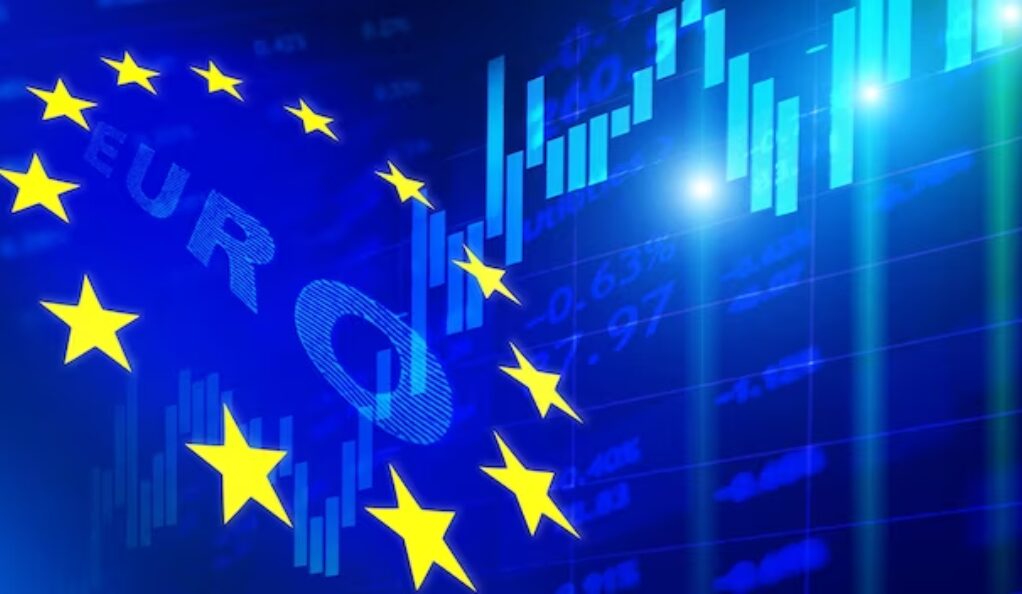European Equities Surge Following Global Rally, Chip Stocks Soar, Central Banks Hold Steady

European equities experienced a robust surge today, propelled by record highs in Japanese stock markets and the Nasdaq. Gains were widespread across sectors, with banks, industrial goods and services, tech firms, and travel and leisure all rising nearly 1.5%.
Global Rally Boosts European Markets
The global financial landscape witnessed a remarkable rally today, leaving its imprint on European stock markets. Investors found reason for optimism as they observed record highs achieved in Japanese stock markets and the Nasdaq. The positive sentiment was infectious, with key sectors leading the charge. Banks, industrial goods and services, tech firms, and travel and leisure all registered impressive gains of nearly 1.5%.
Market experts attribute this synchronized global rally to a combination of factors, including favorable economic data, robust corporate earnings reports, and a general sense of optimism regarding the trajectory of the world economy. Investors are capitalizing on this wave of positivity to fuel their portfolios.
Chip Stocks Rally on TSMC Upgrade
One of the most eye-catching phenomena of today’s trading session was the electrifying performance of the semiconductor sector. The catalyst for this surge was Taiwan Semiconductor Manufacturing (TSMC), which upgraded its profit outlook. TSMC reported a surge in demand for high-end chips used in cutting-edge AI applications, a development that sent shockwaves through the market.

As a result of TSMC’s announcement, the Nikkei reached a 34-year peak, with gains for January nearing an impressive 9%. Leading global chip manufacturers such as Nvidia and Advanced MicroDevices rode the wave of this upward trend in chip stocks, adding further momentum to the sector’s rise.
Central Banks Maintain Stance
Central banks worldwide remained cautious in their monetary policy decisions. The European Central Bank (ECB) is expected to keep its policy steady in its upcoming meeting. Although a rate cut had been anticipated, recent comments from ECB officials suggest that a cut may be postponed until June. Investors will closely monitor the ECB’s decisions, as they have a significant impact on the European and global financial markets.
In other regions, central banks in Canada, Norway, and the United States are not expected to make immediate rate changes. However, Turkey may buck the trend by considering a rate hike to address inflation concerns. Meanwhile, the Bank of Japan is likely to continue its super-easy policy to support economic recovery.
Economic Indicators Awaited
Investors are eagerly awaiting a slew of economic indicators that could provide further insights into the global economic outlook. The U.S. Federal Reserve is currently in a blackout period ahead of its meeting on January 30-31, making these indicators even more anticipated. Key data to watch includes economic growth figures and core inflation numbers. Analysts project that the U.S. GDP will maintain a 2% annualized pace in the fourth quarter, while the core personal consumption price index might slow to 3.0% annually in December.
Currency and Commodity Markets
Currency markets exhibited notable movements as well. The U.S. dollar reached a five-week high, trading flat at 103.25 against a basket of currencies. Meanwhile, the euro remained steady at $1.089. This dynamic in the currency markets reflects ongoing shifts in global economic sentiment.

In contrast, non-yielding assets such as gold became less attractive to investors, with the precious metal priced at $2,023 per ounce. Oil prices showed a slight decline, primarily due to concerns about dampened global demand, reflecting the ongoing uncertainty surrounding the economic recovery.
This comprehensive report underscores the interconnected nature of global financial markets, the profound influence of technological advancements on stock performance, and the critical role that central banks play in shaping economic policies. Investors and financial professionals alike are closely monitoring these developments as they navigate the complex and ever-evolving landscape of the financial world.


Leave a Reply